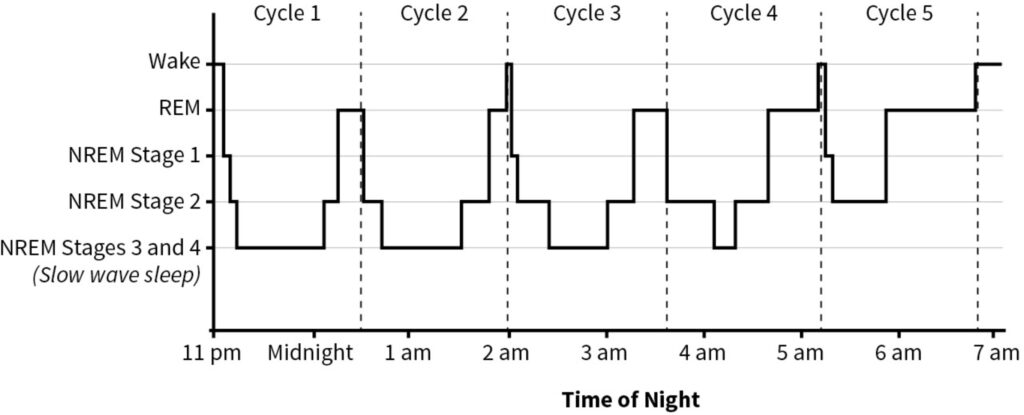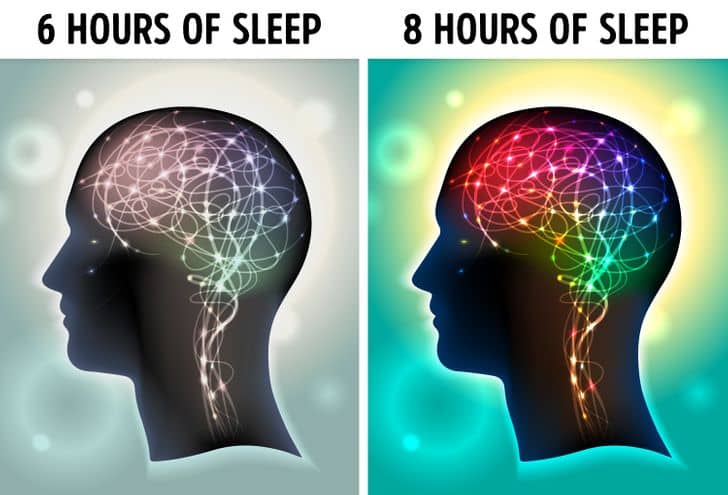Are you ready to dig into the fascinating world of REM sleep? According to Matthew Walker, this is “a key trigger that rocketed Homo sapiens to the top of evolution’s lofty pyramid.” Other mammals have REM sleep cycles, but none as highly proportional as human do. Because of this, Walker posits that this has causally influenced our degree of sociocultural complexity and our cognitive intelligence. Intrigued? Read on…
Tree versus Ground Sleeping
As far as we can see, human reign in regards to sociocultural complexity. Have you ever wondered why that is? Maybe sleep is the key? It begins with our ancient ancestors’ move from sleeping in trees to sleeping on the ground. At first glance that seems absurd but when connected to sleep it makes sense.
Tree sleeping does not allow for much REM sleep because in REM sleep our bodies become totally limp and paralyzed. Being up a tree in this state is a fast-track for falling.

Once Homo erectus discovered fire, they were able to create safer nighttime sleep environments on the ground. This launched a new stage of sleep evolution with an increase in REM sleep. We spend about 25% of our sleep in REM and primates about 9%.
REM and Sociocultural Complexity
“REM sleep exquisitely recalibrates and fine-tunes the emotional circuits of the human brain. In this capacity, REM sleep may very well have accelerated the richness and rational control of our initially primitive emotions, a shift that I propose critically contributed to the rapid rise of Homo sapiens to dominance over all other species in key ways.
We know, for example, that REM sleep increases our ability to recognize and therefore successfully navigate the kaleidoscope of socioemotional signals that are abundant in human culture, such as overt and covert facial expressions, major and minor bodily gestures, and even mass group behavior.
Related, the REM-sleep gift of facilitating accurate recognition and comprehension allows us to make more intelligent decisions and actions as a consequence. More specifically, the coolheaded ability to regulate our emotions each day—a key to what we call emotional IQ—depends on getting sufficient REM sleep night after night.
Second, and more critical, if you multiply these individual benefits within and across groups and tribes, all of which are experiencing an ever-increasing intensity and richness of REM sleep over millennia, we can start to see how this nightly REM-sleep recalibration of our emotional brains could have scaled rapidly and exponentially. From this REM-sleep-enhanced emotional IQ emerged a new and far more sophisticated form of hominid socioecology across vast collectives, one that helped enable the creation of large, emotionally astute, stable, highly bonded, and intensely social communities of humans.
I will go a step further and suggest that this is the most influential function of REM sleep in mammals, perhaps the most influential function of all types of sleep in all mammals, and even the most eminent advantage ever gifted by sleep in the annals of all planetary life. The adaptive benefits conferred by complex emotional processing are truly monumental, and so often overlooked.”
REM and Creativity
As I touched on yesterday, NREM sleep sorts and processes memories, either moving them into long term storage or discarding them entirely. After that, REM sleep steps in to do marvelous things…
“REM sleep takes these freshly minted memories and begins colliding them with the entire back catalog of your life’s autobiography. These mnemonic collisions during REM sleep spark new creative insights as novel links are forged between unrelated pieces of information. Sleep cycle by sleep cycle, REM sleep helps construct vast associative networks of information within the brain. REM sleep can even take a step back, so to speak, and divine overarching insights and gist: something akin to general knowledge—that is, what a collection of information means as a whole, not just an inert back catalogue of facts. We can awake the next morning with new solutions to previously intractable problems or even be infused with radically new and original ideas.”
Creativity is self-limiting unless it is shared with others, hence the importance of social connection.
“Now we can appreciate what I believe to be a classic, self-fulfilling positive cycle of evolution. Our shift from tree to ground sleeping instigated an ever more bountiful amount of relative REM sleep compared with other primates, and from this bounty emerged a steep increase in cognitive creativity, emotional intelligence, and thus social complexity. This, alongside our increasingly dense, interconnected brains, led to improved daily (and nightly) survival strategies. In turn, the harder we worked those increasingly developed emotional and creative circuits of the brain during the day, the greater was our need to service and recalibrate these ever-demanding neural systems at night with more REM sleep.”
REM Timing
Recall that REM sleep occurs more in the early morning hours of sleep. That is why it feels like you only remember your early morning dreams and why it is easy to sleep back into a dream after hitting the snooze button.

Understanding that we first need the NREM sleep for processing and then REM sleep for deeper creativity and intelligence should start to convince each of us to not skip out on any part of it. Now we are starting to understand why we feel truly lit up after a great sleep, and hazy and dull after poor sleep. And there’s so much more to undercover!

All excerpts from Matthew Walker, Why We Sleep
If you have landed on this page from an external link, please go HERE to read from the beginning. Otherwise, click on the next title below to continue.


Leave a Reply
You must be logged in to post a comment.